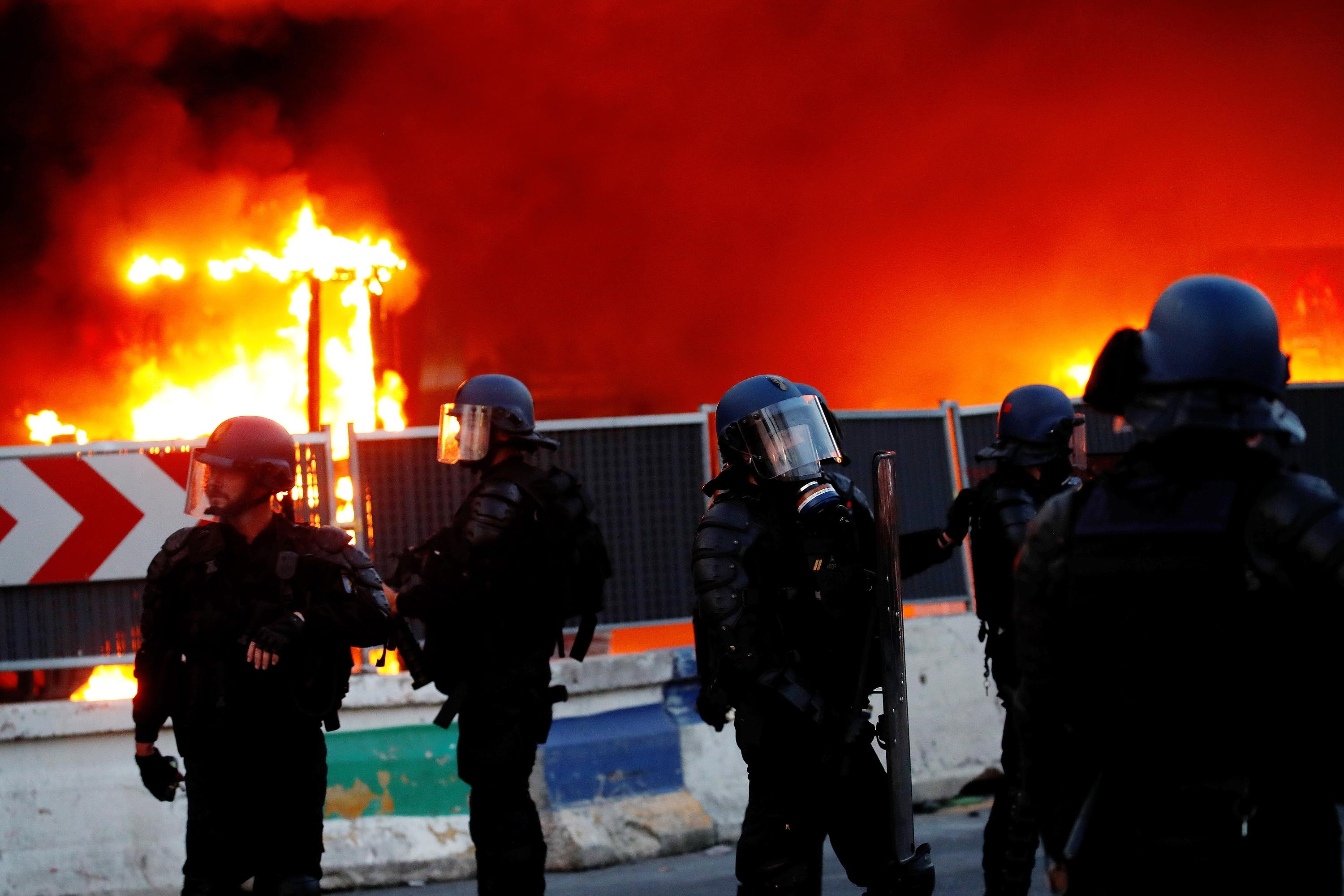The suburban vote. It is central to the electoral strategy put in place by La France insoumise. Behind Jean-Luc Mélenchon, who in a few years went from an intractable secularist to a defender of multiculturalism and religious or ethnic “minorities”, his fellow travelers have made these neighborhoods their priority target. A strategy that pays off in certain respects... But which could prove to be a loser in the long term, by acting as a repellent for a large part of the electorate, including on the left. At least this is what emerges from a survey carried out by Cluster-17 for the weekly Marianne on Wednesday September 20. The publication of this study comes a few days before the demonstration against police violence initiated by several political parties, including LFI, which is creating a stir on the left.
According to this work, the image of rebellious France is better in the famous “QPV” (priority districts of the city) than in the rest of France. When these residents are asked to associate rebels with adjectives, 17% of them choose the qualifiers “serious” and “representative”, compared to only 10% outside QPV. In the suburbs, 19% of respondents associate them with the term “courageous” and 38% with “popular”, compared to respectively 11% and 30% in the rest of the country.
Conversely, residents of QPV are less likely to give them negative descriptions: 36% of them describe them as “worrying” compared to 50% outside QPV. The adjectives “opportunistic” and “disconnected” are also used less in these neighborhoods, with 31% and 30% of respondents respectively compared to 40% and 38% outside the suburbs. Furthermore, LFI is the first political force in which French people in the suburbs trust to improve their purchasing power (28%), well ahead of the RN (17%). Note, however, that the majority of residents in these neighborhoods (47%) do not trust any party on the issue.
However, not all the lights are green. When asked which political party best represented them during the riots following the death of Nahel, the young delinquent shot dead by a police officer, only 16% of QPV residents named LFI. This is more than LR (3%), Reconquest! (3%), or even than the other left-wing parties, EELV (1%), PS (3%) or PCF (3%). But it is as much and even a little less than the RN, which comes first on this point (17%). Perhaps more worrying, when these French people were asked to rate LFI from 0 to 10 on its understanding of their daily problems, the movement only obtained a score of 4 in the suburbs. Here again, this is more than in the rest of France, where the score obtained is 2.5.
In the same way, controversies over the abaya or police violence resonate more favorably in the suburbs than elsewhere. But they are far from being considered priorities. Thus, 49% of respondents from these neighborhoods agree with the declaration of LFI deputy Paul Vannier according to which the ban on the abaya would be “racist, Islamophobic” and would constitute “a diversion aimed at masking the serious difficulties of this return to school », compared to only 34% in the rest of France. Likewise, 37% of them endorse the idea that “the power does not control the police”, to use the words of Jean-Luc Mélenchon, compared to only 24% in the rest of the country.
Please note, however, that these positions taken by LFI leaders on the police and abayas are respectively disapproved by 49% and 40% of QPV respondents and 70% and 59% of non-QPV respondents. This could bring grist to the mill of François Ruffin, who has spoken out on several occasions for a more measured line on these subjects, so as not to turn off a more moderate left-wing electorate. The deputy for the Somme, who stands out as one of the favorite personalities in the neighborhoods (5.6/10) behind Jean-Luc Mélenchon (6.4/10), is in favor of a union between the “France of bars » and the “France of the towns”.
In any case, these central subjects in LFI communication are considered secondary. The survey reveals that French people, both in the suburbs and outside the suburbs, agree that health, education, cost of living, security and housing are at the top of their priorities. The two groups surveyed by Cluster-17 only diverge on the sixth priority: police violence for the first, immigration for the second.
Finally, abstentionists, even more numerous than elsewhere in these neighborhoods, reject all political parties and LFI does not have any preferential treatment. For example, 61% of them do not trust “any” party to improve their purchasing power. In the same way, 64% did not choose “any” political group that was able to represent them during the riots. Finally, LFI only obtains a rating of 2.5 out of 10 from them on the ability to understand everyday problems.
LFI therefore generally does twice as well in the suburbs as in the rest of the country, the result of its electoral investment in these neighborhoods. However, it is not rooted there as a majority political force. For the moment, it maintains the historically dominant scores of the left, without recording any major progress. Above all, this electoral strategy constitutes a repellent for many voters in the rest of the country, where the most radical positions of LFI are poorly received, including by the left-wing electorate.

 What is chloropicrin, the chemical agent that Washington accuses Moscow of using in Ukraine?
What is chloropicrin, the chemical agent that Washington accuses Moscow of using in Ukraine? Poland, big winner of European enlargement
Poland, big winner of European enlargement In Israel, step-by-step negotiations for a ceasefire in the Gaza Strip
In Israel, step-by-step negotiations for a ceasefire in the Gaza Strip BBVA ADRs fall almost 2% on Wall Street
BBVA ADRs fall almost 2% on Wall Street Children born thanks to PMA do not have more cancers than others
Children born thanks to PMA do not have more cancers than others Breast cancer: less than one in two French women follow screening recommendations
Breast cancer: less than one in two French women follow screening recommendations “Dazzling” symptoms, 5,000 deaths per year, non-existent vaccine... What is Lassa fever, a case of which has been identified in Île-de-France?
“Dazzling” symptoms, 5,000 deaths per year, non-existent vaccine... What is Lassa fever, a case of which has been identified in Île-de-France? Sánchez cancels his agenda and considers resigning: "I need to stop and reflect"
Sánchez cancels his agenda and considers resigning: "I need to stop and reflect" “Amazon product tester”: the gendarmerie warns of this new kind of scam
“Amazon product tester”: the gendarmerie warns of this new kind of scam “Unjustified allegations”, “promotion of illicit products”… Half of the influencers controlled in 2023 caught by fraud repression
“Unjustified allegations”, “promotion of illicit products”… Half of the influencers controlled in 2023 caught by fraud repression Extension of the RER E: Gabriel Attal welcomes a “popular” ecology project
Extension of the RER E: Gabriel Attal welcomes a “popular” ecology project WeWork will close 8 of its 20 shared offices in France
WeWork will close 8 of its 20 shared offices in France “We were robbed of this dignity”: Paul Auster’s wife denounces the betrayal of a family friend
“We were robbed of this dignity”: Paul Auster’s wife denounces the betrayal of a family friend A masterclass for parents to fill in their gaps before Taylor Swift concerts
A masterclass for parents to fill in their gaps before Taylor Swift concerts Jean Reno publishes his first novel Emma on May 16
Jean Reno publishes his first novel Emma on May 16 Cannes Film Festival: Meryl Streep awarded an honorary Palme d’Or
Cannes Film Festival: Meryl Streep awarded an honorary Palme d’Or Omoda 7, another Chinese car that could be manufactured in Spain
Omoda 7, another Chinese car that could be manufactured in Spain BYD chooses CA Auto Bank as financial partner in Spain
BYD chooses CA Auto Bank as financial partner in Spain Tesla and Baidu sign key agreement to boost development of autonomous driving
Tesla and Baidu sign key agreement to boost development of autonomous driving Skoda Kodiaq 2024: a 'beast' plug-in hybrid SUV
Skoda Kodiaq 2024: a 'beast' plug-in hybrid SUV The home mortgage firm rises 3.8% in February and the average interest moderates to 3.33%
The home mortgage firm rises 3.8% in February and the average interest moderates to 3.33% This is how housing prices have changed in Spain in the last decade
This is how housing prices have changed in Spain in the last decade The home mortgage firm drops 10% in January and interest soars to 3.46%
The home mortgage firm drops 10% in January and interest soars to 3.46% The jewel of the Rocío de Nagüeles urbanization: a dream villa in Marbella
The jewel of the Rocío de Nagüeles urbanization: a dream villa in Marbella Europeans: a senior official on the National Rally list
Europeans: a senior official on the National Rally list Blockade of Sciences Po: the right denounces a “drift”, the government charges the rebels
Blockade of Sciences Po: the right denounces a “drift”, the government charges the rebels Even on a mission for NATO, the Charles-de-Gaulle remains under French control, Lecornu responds to Mélenchon
Even on a mission for NATO, the Charles-de-Gaulle remains under French control, Lecornu responds to Mélenchon “Deadly Europe”, “economic decline”, immigration… What to remember from Emmanuel Macron’s speech at the Sorbonne
“Deadly Europe”, “economic decline”, immigration… What to remember from Emmanuel Macron’s speech at the Sorbonne These French cities that will boycott the World Cup in Qatar
These French cities that will boycott the World Cup in Qatar Champions Cup: Toulouse with Flament and Kinghorn against Harlequins, Ramos replacing
Champions Cup: Toulouse with Flament and Kinghorn against Harlequins, Ramos replacing Tennis: still injured in the arm, Alcaraz withdraws from the Masters 1000 in Rome
Tennis: still injured in the arm, Alcaraz withdraws from the Masters 1000 in Rome Sailing: “Like a house that threatens to collapse”, Clarisse Crémer exhausted and in tears aboard her damaged boat
Sailing: “Like a house that threatens to collapse”, Clarisse Crémer exhausted and in tears aboard her damaged boat NBA: Patrick Beverley loses his temper and throws balls at Pacers fans
NBA: Patrick Beverley loses his temper and throws balls at Pacers fans


















